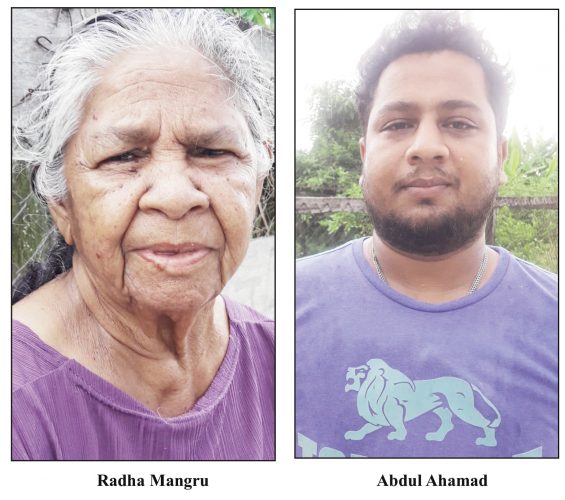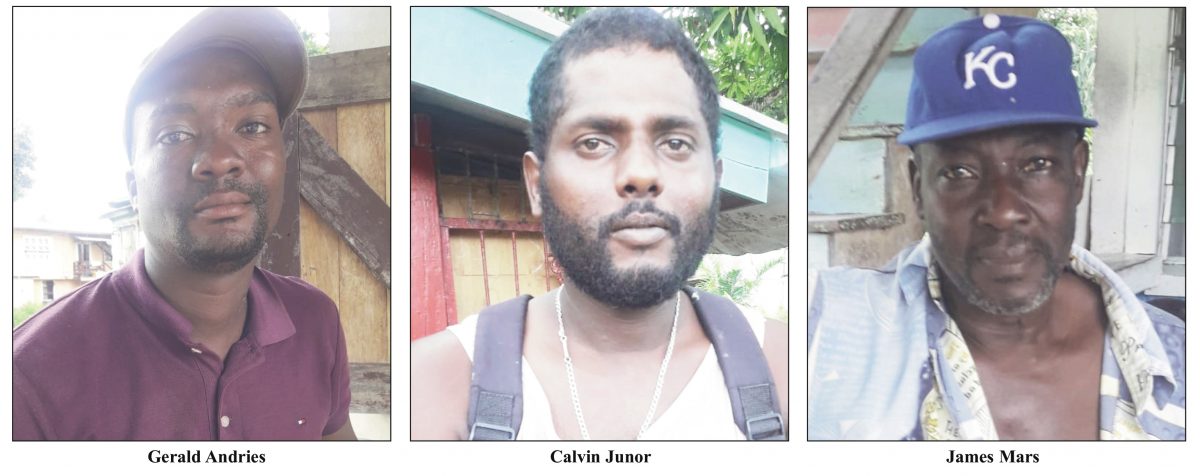The COVID-19 pandemic has affected us in more ways than one, whether work, school, health, or our economic situations. This week residents of Sister’s Village, West Bank Demerara, shared some of their experiences with Stabroek News.
Alana Lindo lives on Gaza Street in the village. She was cleaning some freshly cut pieces of chicken to be cooked later. Lindo still has her job as a security guard and thankfully has never had to be laid off or rotated, but even so she has had her share of issues.
On March 30, a mere few weeks after Guyana had confirmed its first positive COVID-19 case, her husband suffered a stroke. Prior to that, he assisted her financially with his upholstery business but now she has to do it all on her own. Every other month since his stroke, Lindo has been making the long journey with her husband to Berbice for him to see Dr Ramesh Sugrim.
 She has two children who are attending school along with three great-nieces who are also of school age. She is not always at home to tend to them nor does she always have access to the internet. Both of these situations pose a threat to their education. With her many expenses, she needs to save every dollar, but Lindo finds herself putting data in her phone so as to download school work on WhatsApp that is sent for the children living with her. She also got them school books to study from.
She has two children who are attending school along with three great-nieces who are also of school age. She is not always at home to tend to them nor does she always have access to the internet. Both of these situations pose a threat to their education. With her many expenses, she needs to save every dollar, but Lindo finds herself putting data in her phone so as to download school work on WhatsApp that is sent for the children living with her. She also got them school books to study from.
The challenges she faces begs the question, “How do you make out?” “I make out by the grace of God,” chuckled the ever-optimistic Lindo.
Even if the COVID-19 vaccine could help bring about some normalcy like the reopening of school for her children and great-nieces, Lindo said she would not take the vaccine when it arrives here.
Out on the road nearby Lindo, four men were ‘gyaffing’ in the middle of Gaza Street. Preferring to remain anonymous, they had nothing much to say on the pandemic but agreed they would never take the vaccine. As far as they were concerned, all they needed to stay safe, they had said, were their “herbs”. They had every intention of not only sharing their opinions with others about their take on the vaccine, but planned on “enlightening” others on the same.
In a nearby street called Moravian Dam Street, children were riding their bicycles and chatting with their family and friends.
Julie Singh, a shopkeeper, sat in a hammock at her shop looking out for any customers. Her business was once a rum shop but since rum shops are not considered an essential business, she decided to sell groceries instead.
“I had to switch to selling groceries because I cannot open the rum shop. Plus my husband is not getting his regular six days work. He is a driver at Muneshwer Limited,” Singh related.
A mother of four, she said that one of her children had just completed primary school after having written the NGSA exams, while the youngest, a four-year-old, was supposed to have started school earlier this month. “It’s very difficult,” she lamented. They do not have enough money to install WiFi and according to Singh, she tried using the neighbour’s WiFi but the signal is not strong enough. Three months ago, the private school that two of her children were attending, lowered its tuition fees by fifty per cent. School hasn’t yet resumed as they are still trying to figure how they will go about teaching the children.
“Hopefully COVID is over by the then, if the vaccines will come to Guyana later this year [or] next year but if the vaccine will prevent COVID, then I will take it,” she said.
Gerald Andries was busy working on some construction at his house. His sons rode their bicycles back and forth along Moravian Dam Street.
“I hear the vaccines will be out very soon and it will stop the virus. If it’s true and it’s working and I see people get cure with it, then I would take it,” declared the man.
A construction worker, Andries shared that work has slowed quite a bit. He explained that the construction on his house was for a business he planned on expanding. Currently he has a snackette in his yard. Sales, he said, have dropped some fifty per cent.
With regard to his children’s schooling, Andries pointed out a tall antenna on the roof which he explained he put up just recently so that his children can have access to school lessons. All their work comes via WhatsApp. Sometimes there are messages, and sometimes videos are sent.
“Right now everything slow. [I] can’t get to work,” said Calvin Junor. Junor worked as a mechanic with someone at Belle Vue but like so many others, since the pandemic, he has been laid off. He has been doing a bit of mason work here and there. The last time he worked was last Wednesday.
Both his parents he related are not pensioners yet but they rely on him. His father is sickly and is unable to work. Sometimes he would have to take his father to see the doctor.
Whatever work I get
“I do anything. Whatever work I get, I do, mason, painting, wash house, dig drains, anything thing I get I would accept,” said Junor.
He looks forward to the vaccine coming to Guyana explaining that the pandemic has taken a toll on everything including essential business. If the vaccine can take care of this then he is all for it.
James Mars sat in his verandah with his grandchildren nearby. He is a pensioner and doesn’t work. For him, he has been affected by the lockdown by not being able to socialise as he would like.
In addition, the man said that while in the past he would have gone to the shop every day, he has since tried to lessen grocery shopping to once a week. Once the vaccine is clinically tested, he would be open to taking it.
Rabindra Sewsankar doesn’t live in either of the aforementioned streets. He was however at the Moravian Street visiting an aunt. “The only thing that really affect me is the transportation. I would work shift and after some time in the night, you can’t get transportation and you have to take taxi to come home. Before time I would get taxi to come home but not now,” Sewsankar said.
Skeptical about the vaccines, the man said he’d watch and see the progress before he takes a chance on it.
Another pensioner, Radha Mangru, sat on a bench outside of her fence. Her daughter and son live with her. Earlier in the day the teacher had sent a message stating that her son needed to uplift some educational material. At the time he went, the teacher wasn’t at home so he had planned to return the next day.
“Me nah know if I want the vaccine. Them seh the vaccine infected and it jus make you worse. I would have wait see what happens,” opined Mangru
Abdul Ahamad stood on the road. His son stood nearby. When the pandemic had first started, he recalled being rotated and working three days every week. Things have returned to normal somewhat for Ahamad who works at Gafoors as a delivery clerk.
A father of two, only one of his children is of school age. His son attends Belle West Primary School where his wife teaches. Ahamad disclosed that his wife is a fifth grade teacher and the new term has seen his son being promoted to Grade Five. Since his wife sends work for her students on WhatsApp, she homeschools their son. She would have printouts that would be distributed to the children.
The only possible thing to end the pandemic may be the vaccine but not everyone is open to getting it. For Ahamad, he has been seeing various information on social media. What he most wants, if he should decide to be vaccinated, is for the vaccine to be clinically tested. Then and only then would he welcome it.






